Solar Energy: Advantages and Disadvantages in the UK (2023)
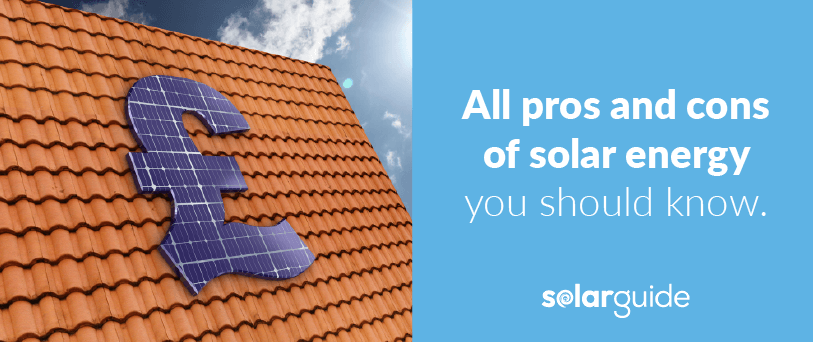
As the advantages of solar energy expand, manufacturers now boast the most efficient solar panels at the lowest prices making it a lucrative investment. Not only because they combat climate change, but also because they significantly lower your energy bills.
Yet solar panel benefits don't stop just there. Over recent years, solar panels have found quite a fan club among UK households. As of February 2023, the total installed capacity of solar energy in the UK reached over 14.4 gigawatts. Out of this total capacity, around 33.4% (which is equivalent to 4.82 GW) came from small-scale solar installations - residential, commercial or community-based solar projects.
In this article, we'll break down other benefits of solar energy as well as their drawbacks to consider.
However, simply sifting through all the pros and cons of solar energy doesn't mean you'll jump onto that solar panel bandwagon tomorrow. Next, comes hours and days of searching for quotes from professionals.
You can sacrifice your valuable time off with family in favour of googling and reaching out to installers. However, you might still end up disappointed with zero reliable contacts at your fingertips.
Fortunately, Solar Guide can help you skip frustrating searches. By filling out a short form, you can receive up to 4 free quotes from local solar panel installers. Just compare the prices and rest assured - you have no hidden fees to pay and no obligation to place any orders. Click below to begin!
Get Free Solar Panel Quotes: Get quotes and compare prices.
Solar energy: advantages and disadvantages
With solar panel grants popping up and the market getting more competitive, more and more people are switching to solar energy. As a result, solar energy has transformed into a highly efficient and clean energy source. However, it’s important to shed light on the fact that there are also some considerations and potential disadvantages to keep in mind.
| Advantages of solar energy | Disadvantages of solar energy |
|---|---|
| Saved money on energy bills | Weather-dependent |
| Reduced carbon emissions | High investment cost |
| Low maintenance costs | Space requirements |
| Renewable energy | Lengthy payback period |
| Return on investment | |
| Diverse applications |
Without further ado, let's consider the key advantages and disadvantages of solar energy for your home.
Advantages of solar energy
Solar panels have several advantages in the UK, including:
- Saving money on energy bills
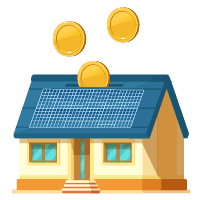
A solar panel should reduce your energy bills unless you pull an all-nighter with an empty solar energy storage, of course. Your savings will depend on your solar system size and your electricity consumption.
You can actually calculate your potential bill savings using various tools. Most of them require information about your solar panel size, annual output, battery warranty, cost of battery storage, hourly electricity price and electricity export percentage.
- Reduced carbon emissions
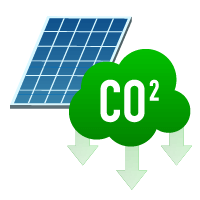
Solar panels are environmentally friendly and can help reduce carbon emissions by producing clean energy. The average residential solar PV (photovoltaics) system in the UK saves between 1.3 and 1.6 tonnes of carbon dioxide from entering the atmosphere each year.
By harnessing the power of the sun, they help us rely less on fossil fuels, which means we can say goodbye to those pesky greenhouse gas emissions that contribute to climate change.
Moreover, solar panels play a crucial role in curbing deforestation, as they provide a clean and renewable alternative to energy sources that require cutting down trees.
- Low maintenance costs

Once installed, they can operate for many years with little to no maintenance. Unlike heat pumps, wear-and-tear hiccups don't happen with solar panels as there are no moving parts.
The only part that requires regular changes is the solar panel inverter which you need to replace every 5-10 years.
So, for proper maintenance, you need to clean your panels a few times a year, whether by yourself or through a cleaning company. Moreover, most solar panel manufacturers provide a lengthy warranty which can reach up to 25 years.
- Renewable energy
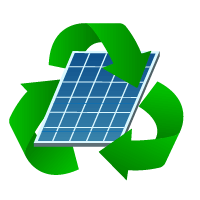
Solar panels generate renewable energy that is sustainable and inexhaustible. They can be used to generate electricity anywhere, as long as there is sunlight.
While we can run out of energy stored in panels due to bad weather conditions, we can't run out of sun. Moreover, in winter solar panels also have the remarkable ability to continue generating electricity even when covered by snow. Additionally, during cold and clear days, the snow on the ground can act as a mirror, reflecting additional sunlight onto the panels.
This means as long as your weather and climate allow you to collect energy, you can account for regular electricity production.
- Return on investment
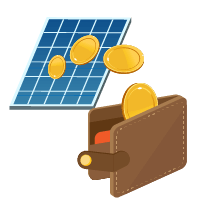
What are the advantages of solar energy for your wallet apart from reduced bills? Solar power can get you a few pennies back through the SEG (Smart Export Guarantee) initiative*. By registering in this scheme, you can earn money for your extra electricity returning back to the National Grid.
Find an SEG licensee near you and check if you're eligible for the SEG. Next, your SEG licensee will offer you a tariff plan which will determine your rate, contract duration, and payment schedule.
*only available in England, Scotland, and Wales.
- Diverse applications
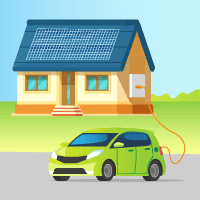
Solar panels can be used to produce heat or electricity for homes as well as for charging home appliances and even electric cars with free energy. To do that, you'll need to connect your solar panels to an inverter which converts the solar DC (Direct Current) energy into AC (Alternating Current) energy. Next, install and connect an EV (Electric Vehicle) charging station to the inverter and your electric car.
Are you already dreading the thought of spending your weekend searching for an installer instead of time out with friends? Indeed, googling the quotes and reading customer reviews might take hours of your time with no guarantee of successful finds.
Solar Guide is here to help you avoid time-consuming browsing. Complete our short form and receive up to 4 free quotes from trusted solar panel installers in your area. Our service is free and non-binding - just compare the offered quotes with no pressure to place any orders. Click below to get hassle-free solar quotes.
Get Free Solar Panel Quotes: Get quotes and compare prices.
Disadvantages of solar energy
Let's look at the core disadvantages of solar energy which separate the sunny stories from the bitter truths. These are a few drawbacks associated with solar panels:
- Dependence on weather conditions
Solar panels rely on sunlight for generating electricity, so their effectiveness diminishes during cloudy or rainy weather. Moreover, it should be noted that solar energy can't be accumulated during the night.
Electricity usage is measured in kilowatt-hours (kWh). On average, the UK gets four hours of sunlight per day, so each square metre of solar panels can generate between 0.6kWh and 0.8kWh of energy. This means that if you have a 4kW solar system, it can produce around 2.4kWh to 3.2kWh of energy every day.
So, let’s say you have a solar system with a total capacity of 4kW. With an average of 4.9 hours of sunlight per day, you can expect to receive about 19.6kWh of power each day from your solar panels.
However, it’s important to keep in mind that the actual power output may vary depending on the specific provider.
The amount of power you need to generate depends on where you’re installing your solar panels and how much electricity you use. A typical British home consumes approximately 3,800kWh of electricity per year, which is roughly equivalent to a little over 10kWh per day.
This is a notable disadvantage for areas in the UK where the number of sunlight hours is lower than 4. This fact can lower the efficiency of your solar panel.
- High investment costs
Many factors influence the cost of solar panels, posing a significant financial hurdle for some homeowners. However, the prices of solar panels have substantially decreased in recent years, making them more affordable.
Based on the system size you choose, your roof space, and the necessary number of panels, the estimated costs of a solar panel might stretch between £2,500 and £13,000.
- Space requirements
The more electricity you need to produce, the more panels you need. Therefore, sufficient space is necessary for installing solar panels, and most systems are typically mounted on rooftops.
This limitation can be disadvantageous for homeowners with limited roof space or those residing in apartments. Moreover, if your rooftop is in poor condition, it will need to be replaced or renovated before installing solar panels.
- Lengthy payback period
On average, the payback period for a solar panel in the UK stretches between 6 to 10 years. This timespan can fluctuate due to electricity prices, energy consumption, tax credits or net metering programs. Moreover, if your location doesn’t get enough sun, this period might last even longer since you’ll need to use more electricity.
You can cut down your solar panel payback period by receiving payments from the SEG scheme for exporting your excess electricity back to the National grid.
That being said, while there are multiple advantages of solar panels for UK homes, such as reduced energy bills and carbon emissions, it’s important to consider the drawbacks mentioned above, including weather dependency, upfront costs, and space requirements.
Nonetheless, the advantages of solar energy often outweigh the disadvantages, making them a promising option for homeowners seeking to decrease their carbon footprint and save on energy expenses.
Conclusion
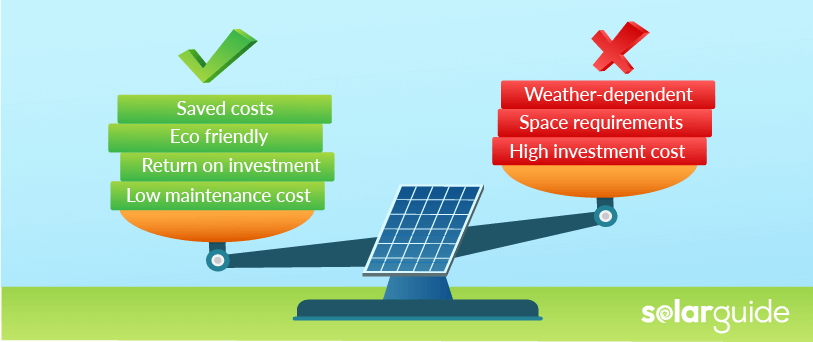
UK homeowners have a brilliant opportunity to bask in the sunny side of life by considering the installation of solar panels. Not only do they offer a ray of hope for the environment, but they can also give your finances a much-needed boost.
With the impressive installed capacity of solar energy in the country and the dazzling success of small-scale deployments, it’s clear that solar power is the “bright” choice in the UK.
Solar panels bring a sunny disposition to homeowners, helping them reduce their carbon footprint as well as their electricity bills. It can even turn your roof into a money-making machine by generating excess energy as well as increase your property value if you ever decide to sell your house.
Of course, it’s essential to consider certain circumstances where solar panels may be less suitable. For instance, if you live in an area with limited exposure to sunlight or have a roof that doesn’t face the right direction for optimal sun absorption, the benefits of solar panels may be less attractive.
However, for the majority of UK homeowners, the installation of solar panels offers an incredibly compelling opportunity. It’s your chance to embrace clean, renewable energy and revel in the myriad advantages it brings.
Get solar panel quotes
Once you weigh all solar energy advantages and disadvantages and decide to search for quotes, you need to take the following steps:
- Search for grants.
- Research solar panel installers near you.
- Read the reviews.
- Request quotes.
- Compare the quotes.
With Solar Guide, you can minimise your searches and start from step 5! Simply complete our short form and compare up to 4 solar panel quotes from certified installers in your area. Our offer is free and non-binding. Click the button below to get solar quotes and save time.
Get Free Solar Panel Quotes: Get quotes and compare prices.
FAQ
What are the 5 advantages of solar energy?
Solar energy in the UK has several advantages, including being a renewable and clean energy source, reduced carbon emissions to combat climate change, lower electricity bills for homeowners who generate their own solar energy, government incentives such as the SEG, and minimal maintenance required for solar panels.
What is the lifespan of solar panels in the UK?
Solar panels in the UK have a lifespan of around 25 years but can last longer with proper maintenance. It’s important to regularly clean and inspect the panels to ensure they are functioning properly and to replace any damaged or worn components.
Do solar panels work in winter in the UK?
Yes, solar panels can still generate energy in winter in the UK. Yet, the amount of energy generated may be lower due to reduced daylight hours and weather conditions, which is one of the disadvantages of solar energy. However, advancements in solar technology have improved the efficiency of solar panels, making them more reliable even on cloudy days.
Find local, MSC certified Solar Installers
Start your quote
Find local, MSC certified Solar Installers














